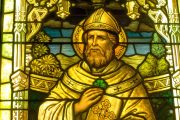Earlier this month, a flood of reminders about the death of Martin Luther King (shown on right) 50 years ago arrived, as all elements of the mass media told Americans about the anniversary of a gunman killing this paragon of virtue and bravery on April 4, 1968. The reports insisted that King was the nation’s most eminent apostle of nonviolence, a heroic advocate of peace in our nation’s racially turbulent era, and an exponent of all virtues. The truth is that King was a highly flawed individual whose actual strategy for change wasn’t peace. The strategy he relied on consisted mainly of a process he had learned from known communists, whose indisputable goal was the destruction of our nation.
Mrs. Julia Brown, who went undercover for the FBI for more than nine years as a member of the Communist Party in Cleveland, Ohio, gives a testament to Martin Luther King, Jr.’s connection to the Communist Party:
I learned many surprising things while I served in the Communist Party for the FBI. Communist leaders told us about the demonstrations that would be started, the protest marches, the demands that would be made for massive federal intervention.
… Wherever we went and whatever we did, we were to promote race consciousness and resentment, because the Communists know that the technique of divide and conquer really works.
We were also told to promote Martin Luther King, to unite Negroes and whites behind him, and to turn him into some sort of national hero.
Because there were individuals who didn’t want their community disturbed by parades, demonstrations, and confrontations, they were easy to provoke, and King’s people did provoke them. As history has shown, King’s on-the-scene allies — often nonresidents of the targeted area — would frequently gather local individuals and provoke fistfights, head cracking, and other forms of violent behavior. In numerous instances, the King-led team supplied trained agitators to stir up the mayhem. (This, of course, does not excuse any violent behavior — whether provoked by MLK’s recruits or caused by genuine racists.) The goal of the manufactured turmoil was federal legislation imposing increasing amounts of government control over the entire nation.
With the help of dishonest media reporters who failed to report King’s strategy, new laws enhancing federal power were indeed enacted. King’s effectiveness in building socialistic government won him plaudits from left-wing politicians and lazy or complicit media stalwarts.
Soon, however, to stave off trouble, courageous black Americans began to arrive in targeted cities prior to the marches and demonstrations planned by King. They would explain King’s strategy to blacks and whites so well that the sought-after violence never materialized. Several communities in Virginia, North Carolina, and Georgia benefited greatly after the King strategy had been explained and the planned confrontations were called off. Julia Brown, Leonard Patterson, Lolabelle Holmes, and other patriotic black Americans told worried residents of the King-targeted regions — both black and white — what to expect and how to avoid violent protests that would ruin their communities and harm their residents. Their extremely effective warnings led to the cancellation of King’s plans in many areas.
King was no pacifist, rather he had received training from communist leaders at the subversive Highlander Folk School in Tennessee to sow discord. He accepted funding from several communist leaders and organizations, and no less a government official than Attorney General Robert Kennedy directed the FBI to create wiretaps and other forms of surveillance over King and his fellow agitators. Therefore, the federal government knew that King was being used by known and secret communists. But a 1977 court order sealed all that evidence of treachery in the National Archives.
When King’s plan to create civil rights riots was no longer working, he turned his attention to the Vietnam War, accusing our nation’s forces of wantonly killing “a million South Vietnamese civilians, mostly children.” He likened the efforts of America’s men in arms to what Hitler’s forces had done to innocent people before and during World War II. One made-up charge after another, no matter how ghastly, came out of the mouth of this supposed man of peace and honor.
He seemed dishonest to the core: Researchers of the early King years showed that he had earned his degree from Boston University via widespread plagiarism, and some who have examined his career have indicated that, far from being a man of God, he was a consistent philanderer who should have been scorned, not awarded an angelic reputation.
The truth about this man and his career will eventually be known. Even without unsealing the documents, enough is known about King to conclude that those who established a national holiday to honor him should themselves be scorned. Martin Luther King, an enemy of freedom and a seriously flawed individual, should never be lauded by anyone who understands the importance of truth.
John F. McManus is president emeritus of The John Birch Society. This column appeared originally at the insideJBS blog and is reprinted here with permission.




